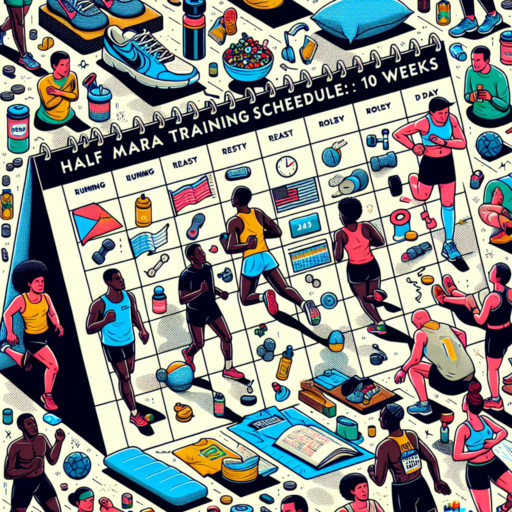Can I get ready for a marathon in 16 weeks?
Preparing for a marathon is a daunting yet exhilarating challenge that many runners set for themselves. A frequently asked question is, «Can I get ready for a marathon in 16 weeks?» The answer to this question largely depends on your current level of fitness, running experience, and commitment to a structured training plan. For beginners, this timeframe is on the edge of feasibility but absolutely possible with dedication and a carefully considered training approach.
Understanding the Basics of Marathon Training
Marathon training is not merely about racking up miles. It involves a comprehensive blend of long runs, speed work, recovery, and endurance-building exercises. A 16-week marathon training plan typically breaks down into several phases, each with a specific focus to gradually increase your mileage and speed while allowing adequate recovery. Starting with a solid base of running at least 15-25 miles per week before diving into this tight schedule is crucial for reducing the risk of injury.
The Role of Cross-Training
Incorporating cross-training into your marathon preparation can be a game-changer. Activities such as cycling, swimming, or using an elliptical machine help build cardiovascular fitness without the added impact on your joints. Strength training, focusing on core, leg, and arm muscles, also plays a vital role. These exercises improve your running economy and can keep you running stronger, longer.
Could you train for a marathon in 4 months?
Certainly, training for a marathon in four months is a challenge that requires a careful approach, dedication, and a well-structured plan. While it may seem daunting, with the right strategy, it is entirely possible for beginners and experienced runners alike to prepare for a marathon in this timeframe.
Understanding Your Starting Point
Before embarking on a marathon training journey, it’s crucial to assess your current fitness level. If you have a base of running 15-20 miles per week, you’re in a good position to start marathon training. However, if you’re starting from scratch, you’ll need to gradually build up your mileage, focusing on consistency rather than speed. For beginners, the key is to start slow, increasing your weekly mileage by no more than 10% to avoid injuries.
Key Components of Marathon Training
- Long Runs: Gradually increase the distance of your weekly long run. This run is essential for building endurance and teaching your body to utilize fat as a fuel source.
- Speed Work: Incorporating intervals or tempo runs helps improve your lactate threshold, which is vital for marathon racing.
- Recovery: Equally important as training days, rest days allow your body to repair and strengthen. Listening to your body and giving it the time to recover is crucial for avoiding overtraining and injuries.
The journey to running a marathon in four months is a testament to personal growth, pushing your limits, and discovering what you’re capable of. With a committed mindset and a structured training program, crossing the finish line of a marathon is within your reach.
What is the strategy for a sub 4 hour marathon?
Achieving a sub 4 hour marathon is a milestone for many runners, reflecting significant dedication, training, and strategy. To break this barrier, a precise plan focusing on consistent pacing, nutrition, and mental resilience is essential.
Optimizing Pacing
The first step in your strategy should be establishing and sticking to an optimal pacing strategy. Aiming for a pace of just under 9 minutes per mile (or about 5:35 per kilometer) is crucial. This consistent speed not only helps in maintaining energy levels but also ensures you’re not starting too fast and risking exhaustion before the finish line. Utilizing a running watch or app to keep track of your pace can be incredibly beneficial, helping you make real-time adjustments as needed.
Nutrition and Hydration Plan
A well-thought-out nutrition and hydration plan is equally critical. During the race, your body will need a steady supply of energy and fluids to maintain performance. Experimenting with various types of energy gels, bars, and drinks during your training runs will help you understand what works best for your body. On race day, aim to consume carbohydrates and hydrate adequately before fatigue sets in, typically starting even before the 30-minute mark and continuing at regular intervals.
Mental Preparation
Lastly, the mental aspect of running a marathon cannot be underestimated. Visualize the racecourse, set realistic goals, and develop a strong inner dialogue. Preparing for the inevitable challenges and having strategies to push through tough moments are integral parts of achieving a sub 4 hour marathon. Surrounding yourself with supportive people, joining a running group, or working with a coach can also provide motivation and accountability, critical components for your success.
No se han encontrado productos.
How many times should I run 20 miles before a marathon?
Preparing for a marathon involves detailed planning, and understanding the optimal number of 20-mile runs is crucial for success. The ideal frequency of 20-mile runs depends on various factors including your running background, goals, and the specific marathon training plan you’re following. It’s generally suggested that 1 to 3 long runs of this distance are beneficial during the marathon training cycle.
Commencing these long-distance runs should be approached with care, ensuring they’re spaced out over the course of your training to prevent injury. Incorporating adequate recovery time is essential, as these runs heavily tax the body. Additionally, these long efforts are perfect for testing your marathon pace, nutrition, and hydration strategies, making them not just about covering the distance, but also about fine-tuning your marathon day preparation.
While the exact number can vary, integrating too many 20-mile runs in a short period can lead to overtraining and diminish the quality of your other workouts. Balance and variation are key; thus, blending these runs with shorter, more intense sessions and rest days will yield the best overall progress and readiness for race day.




